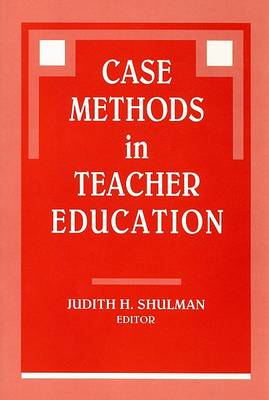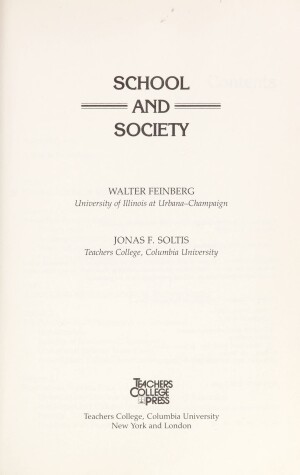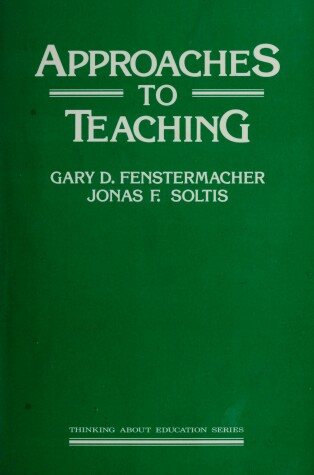Thinking About Education
5 total works
Rather than simply outlining the classical and modern theories of learning, the authors of this aim to work bring the material to life through case studies that engage students in debate about what really happens in classrooms. This expanded and revised edition allows students to test the strengths and weaknesses of various learning theories, helping them to formulate their own philosophies of teaching. Among the concepts that this edition explains are: the Platonic theory of learning - the logic of innate ideas and concepts; the competing empiricist, "blank slate", theory developed by John Locke; the basic features of behaviourism and operant conditioning; the "insight" learning theory of the Gestalters; John Dewey's theory that learning is an experientially active affair; a new chapter on the importance of social interaction and the work of Vygotsky; Piaget's biological model of the development of cognitive structures; and the emerging "cognitive science" approach, comparing the human mind with the computer and artificial intelligence.
The power of this text lies in its insistence that pre- and in-service teachers need to understand the problematic nature of learning theory and continually question and develop their own "perspectives on learning".
The power of this text lies in its insistence that pre- and in-service teachers need to understand the problematic nature of learning theory and continually question and develop their own "perspectives on learning".
This revised and expanded Second Edition uses a new format to invite moral deliberation in the concrete contexts of specific ethical dilemmas. Each chapter is organized to challenge thinking. First, a hypothetical "case" is presented. This case is followed by a "dispute" in the form of a dialogue that points out salient ethical issues in an intuitive way. Next is a discussion of "concepts", which brings major ethical issues to bear. Then, "analysis" shows what decisions could ultimately be reached based from both consequentialist and nonconsequentialist perspectives. Finally, each chapter ends with additional similar cases for practice, discussion, and resolution. Chapters cover such timely issues as punishment and due process, intellectual freedom, equal treatment of students, democracy, relativism, deliberation, and reflective equilibrium. Throughout, emphasis is placed on the nature of ethical thinking: asking questions, exploring options, understanding various perspectives, and making decisions - the very type of thinking skills that teachers hope to nurture in their students.
The revised and expanded second edition of "Curriculum and Aims" provides a broad perspective on the basic curriculum questions educators face regarding the purposes, content, design, and structure of educational programmes. After examining aims that have been proposed by classical educational thinkers and reviewing the dominant educational debate of this century between traditionalists and progressives, authors Decker F. Walker and Jonas F. Soltis deal with fundamental issues of curriculum theory and instructional practice, raising such questions as: who has the authority to make curriculum decisions?; when is a curriculum change a change for the better?; should curriculum be thought of as a set of subjects to be learned or as a set of experiences for people to have?; which perspective - student-, society- or subject-centred - best guides the design of general education in a democratic society?; what do contemporary scholars who have studied and critiqued curriculum of the past and present have to offer practicing teachers?; if we as a pluralistic society "aim" our educational programmes, how can we do so democratically, fairly, and justly?; what questions should be considered during the process of curriculum deliberation?
As in the other volumes in the "Thinking About Education Series", a final "Cases and disputes" chapter provides realistic case studies, dialogues, and open-ended questions designed to stimulate thought and discussion.
As in the other volumes in the "Thinking About Education Series", a final "Cases and disputes" chapter provides realistic case studies, dialogues, and open-ended questions designed to stimulate thought and discussion.
In the revised and expanded second edition of "Schools and Society", authors Walter Feinberg and Jonas F. Soltis invite teachers and administrators to develop their ability to question basic aspects of the relation between school and society and to understand different approaches to educational research. They suggest that unless educators understand how social, economic, and political forces influence what happens in schools and what researchers investigate, they will not be empowered to assume responsibility for educational reform. Three major theoretical frameworks are presented as starting points for exploration: functionalism - posits that the schools' primary function is to socialize students so that they conform to the norms and practices of society; conflict theory - asserts that the schools are supported and used by those in power to preserve inequitable class relations; and interpretist approach - suggests that the purposes of individual actors and the social meanings they share with others determine how a social situation is interpreted and understood.
As in other volumes in the "Thinking about Education Series", a final "Cases and Disputes" chapter provides realistic case studies, dialogues, and open-ended questions designed to stimulate thinking about the issues embedded in current school- and society-related problems, including curriculum reform, social justice, and competing forms of research.
As in other volumes in the "Thinking about Education Series", a final "Cases and Disputes" chapter provides realistic case studies, dialogues, and open-ended questions designed to stimulate thinking about the issues embedded in current school- and society-related problems, including curriculum reform, social justice, and competing forms of research.
This text has been designed for students just starting their study of education as well as for experienced teachers. Its main aim is to provide deep reflection on what teaching is and should be. Using both classical and contemporary perspectives, the authors describe three basic approaches to teaching and explore the strengths and weaknesses of each. The executive approach views the teacher as a skilful manager of learning who brings about high levels of student achievement. The therapist approach views the teacher as an empathetic, caring person who helps students reach high levels of self-actualization. The liberationist approach views the teacher as a freer of the mind and developer of the students' intellectual and moral virtues. A set of cases and disputes provides realistic context for teachers to critically assess the philosophical positions on teaching that they are developing. The second edition adds updated references to each approach and provides a useful index.



